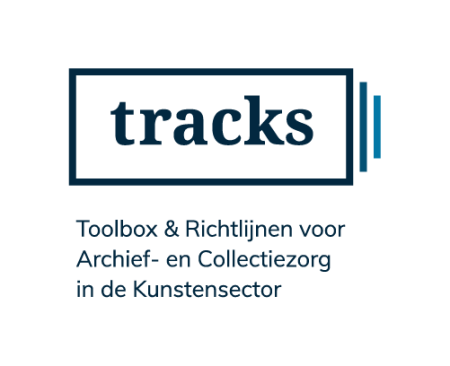Intellectual property rights webinar on new TRACKS site now!
24 Sep 2020Intellectual property rights in the arts sector are not a straightforward matter. We’d therefore like to clear things up for you in a brand-new webinar, in the run-up to a Q&A session with Joris Deene on 20 October. Make sure you also check out the updated projecttracks.be site once you’ve attended the webinar.
TRACKS is short for ‘Toolbox & Richtlijnen voor Archief- & Collectiezorg in de Kunstensector’ (Toolbox & Guidelines for Archive & Collection Care in the Arts Sector). Together with nine other partners, we want to encourage organisations and individuals in the arts sector to care for their own archive and collection(s). And now we’re doing it with an updated platform. The layout has been freshened up, and we’ve cleaned up all the various tools together with our partners.
The result is up-to-date tools and practical examples that are easy to access and read. Discover 10 important tips below!
You can now find a (fully subtitled in Dutch) webinar at projecttracks.be, which answers questions such as:
What can and may you do with archive content that’s protected by copyright?
What needs to be documented?
How do you need to document it?
How do you perform a risk analysis?
Once you’ve watched the webinar, you can delve even deeper into the topic in a virtual Q&A session on 20 October at 3pm, which we're organising together with Centrum Kunstenarchieven Vlaanderen (Flemish Centre for Art Archives), Letterenhuis (House of Literature), Kunstenpunt (Flanders Arts Institute), VAi (Flemish Architecture Institute), CEMPER (Centre for Music and Performing Arts Heritage) and AMVB (Archive and Museum for the Flemish Living in Brussels). Send us your questions via the registration form before 14 October, and we’ll be happy to answer them together with lawyer and intellectual property rights expert, Joris Deene
Can’t wait to get started? These 10 tips will help you, your archive and your collection take your next steps.
Have a good overview of your archive to ensure you can be clear about your ambitions. You can then use this as a basis to set your objectives and determine what you need to do to achieve them – a good starting point for taking good care for your archive and collection.
Good archive management means you know what you need to keep... and what you don’t. So make time for this when you complete a case or project, or plan in a trash day.
Before you can do anything with your archive or collection, you first need contextual information about the archive, to ensure basic registration of your collection, and to record all this information in a sustainable way. How do you do this? Find tips and templates here.
Did you know that your archive or collection(s) are subject to various intellectual property rights? There are copyright laws, portrait rights, neighbouring rights and database rights. Read here what they look like and how to deal with them.
Good agreements make good friends. So try to make clear and legally secure agreements when creating content that’s subject to intellectual property rights, for example with freelancers. Check out a model agreement here.
When you publish content online that can be re-used freely, use a standard licence. Looking for the right Creative Commons licence for your work? We will help you find your way, with questions and answers about the conditions under which your work can be used.
In order to ensure your digital archive remains readable and usable in the long term, it’s important to take a few precautions. You need to consider a sustainable format, regular checks, good storage and backing up. How do you get started?
Should you scan your own collection, or is it better to call in help from a professional? Read our tips and then make your own informed decision.
General Data Protection Regulation (GDPR) is usually spoken about in the context of websites and newsletters, but personal data processing also often comes into play in the field of archiving. Find out here what this means for your archive and how to deal with it.
We’re all proud of the treasures in our archives. Registering your archive and collection(s), and making them findable, means you can share them with the whole world. Read here how to get started and what you need to consider.

